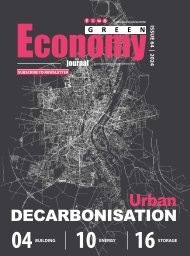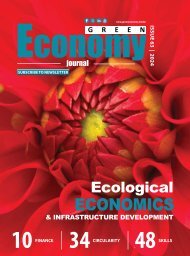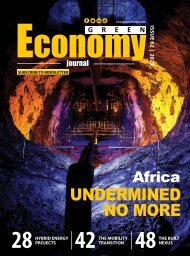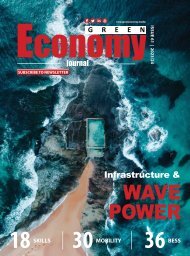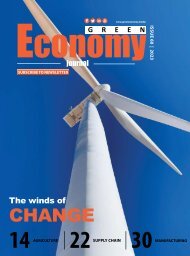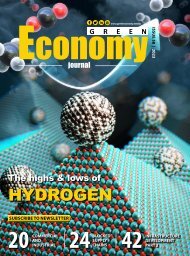You also want an ePaper? Increase the reach of your titles
YUMPU automatically turns print PDFs into web optimized ePapers that Google loves.
NEWS & SNIPPETS<br />
NEWS & SNIPPETS<br />
SOUTHPAN SOLAR PLANT<br />
Globeleq, the leading independent power company in<br />
Africa, has completed a $71-million (ZAR1.2-billion) senior<br />
debt restructuring of its 31MW Soutpan Solar Power plant in<br />
Limpopo Province, one of the first solar power plants built<br />
under South Africa’s Renewable Energy Independent Power<br />
Producer Procurement programme. By lowering the cost of<br />
debt for the project, the refinancing allows for a significant<br />
reduction in wholesale electricity prices from the plant,<br />
creates a more efficient capital structure enabling release of<br />
funds for shareholders to reinvest in the power sector and<br />
accelerates equity distributions to Soutpan’s community and<br />
BEE shareholders.<br />
Standard Bank Limited led the restructuring of the debt,<br />
alongside the project’s original lender, Vantage <strong>Green</strong> X Fund.<br />
Soutpan started operations in 2014 and Globeleq acquired a<br />
majority interest in the plant in 2019. Since then, Globeleq has<br />
managed the full scope of operations and maintenance and has<br />
implemented a plan to enhance performance, efficiency, and<br />
safety at the plant.<br />
Globeleq’s CEO, Mike Scholey says, “The successful Soutpan<br />
restructuring is an important transaction which will save Eskom<br />
more than ZAR160-million over the remaining ten years of the<br />
agreement. This is the fourth renewable project that Globeleq<br />
has restructured under the Department of Mineral Resources and<br />
Energy’s IPP Office Refinancing Protocol and further demonstrates<br />
our commitment to supporting initiatives that benefit energy<br />
users and encourage investment while loadshedding continues.”<br />
“Standard Bank is delighted to support Globeleq and underwrite<br />
Soutpan in the restructure of its debt which has allowed for a<br />
tariff saving to Eskom and ultimately the South African consumer.<br />
Standard Bank has been involved with Soutpan as Mandated Lead<br />
Arranger and Hedge Provider since 2012 when Soutpan started<br />
construction. Our longstanding partnership and journey together<br />
demonstrates Standard Bank’s commitment to the renewable<br />
sector and our client relationships,” says Sherrill Byrne, Executive<br />
Energy, and Infrastructure Finance.<br />
LOADSHEDDING AFFECTS WATER<br />
Loadshedding is not just about the inconvenience of being without<br />
lights or television and the means to cook a meal, it negatively<br />
impacts our ability to earn a living, seek reliable healthcare, have<br />
confidence in the cold chain through which most of our food is<br />
moved, and – as recent news reports highlight – trust the quality of<br />
the water in our taps.<br />
The City of Cape Town has warned of water supply shortages related<br />
to loadshedding while the Breede Valley Municipality urged residents<br />
to boil water as electricity outages hit its water and waste-water<br />
treatment plants hard.<br />
Johannesburg Water has said that many of its customers in higherlying<br />
areas experienced low pressure to no water during load shedding<br />
and asked those in lower-lying areas to use water sparingly to assist<br />
with the recovery of the affected infrastructure.<br />
Similarly, the City of Tshwane and uMgungundlovu District<br />
Municipality in the KwaZulu-Natal Midlands have explained that their<br />
reservoirs rely on a continuous flow to maintain levels and be prepared<br />
for outages. That continuous flow relies on the pump stations running<br />
10<br />
to move the water and the pump stations rely on Eskom’s grid to<br />
provide the power.<br />
Exacerbating water quality challenges in KwaZulu-Natal are the<br />
floods in April 2022. These damaged eight sewerage treatment plants<br />
and resulted in millions of litres of untreated sewage spilling into the<br />
beaches, rivers, harbours and ocean in and around Durban. Only some<br />
of the infrastructure has been repaired, and Durban’s waters are still<br />
contaminated.<br />
“The lack of water in our taps and questionable quality of what water<br />
there is will see more and more South Africans turning to bottled water<br />
for drinking and cooking,” said South African National Bottled Water<br />
Association (SANBWA) CEO, Charlotte Metcalf.<br />
“While this is good news for the industry as a whole, for an<br />
organisation like SANBWA whose members comply with a stringent<br />
standard that benchmarks favourably against others found globally, it<br />
also rings alarm bells.<br />
“This is because the growth will likely attract many new entrants into<br />
the market, but not all of these will comply with the strict standards<br />
required the FC&D Act, the legislation that regulates all enterprises in<br />
South Africa packaging water for sale to the public.<br />
“In addition, fly-by-night operators think nothing of bottling<br />
waters from unsuitable sources under unsanitary conditions and into<br />
packaging that might not even be sterile.”<br />
Charlotte Metcalf South African National Bottled Water Association<br />
(SANBWA) CEO.<br />
“One way consumers can protect themselves is to look for the<br />
SANBWA logo on a bottle of water. This guarantees that the product<br />
is genuine natural mineral or spring water, and that the source is<br />
sustainable, she said.<br />
Metcalf suggested you take the following measures if you suspect<br />
load shedding is negatively impacting your water supply:<br />
• Boil the water from your tap and allow it to cool before using it to<br />
drink and wash salad ingredients.<br />
• If you opt to make use of a home filtration system make certain<br />
that you select one that delivers what the brochure or website<br />
promises as recent research has highlighted that not all systems<br />
are created equal nor live up to their marketing messages.<br />
• Only purchase bottled water featuring the SANBWA logo on<br />
the bottle because that logo guarantees that the water in that<br />
bottle comes from uncontaminated sources and that the bottling<br />
facility is hygienic and operated according to legislation and good<br />
manufacturing practices.<br />
• Avoid buying water from retailers who fill new containers in-store<br />
– this is an illegal practise as the legal requirements to bottle<br />
a food product cannot be adhered to. They are mostly filling<br />
from a municipal source thus using the limited available water<br />
during loadshedding.<br />
• Refuse the restaurant’s offer of water in a jug or its own ‘bottled<br />
water’. These bottles are usually filled using a countertop filling<br />
system connected to the municipal source, which may or may not<br />
be contaminated. Further, there is no guarantee the bottles and<br />
the ‘Grolsch’ cap they are typically closed with have been properly<br />
cleaned and sanitised before being filled. The moment water is<br />
pre-filled it needs to conform with packaged water legislation. In<br />
the restaurant filling set-up this is not possible.<br />
SECURITY<br />
INSPECTION<br />
AGRICULTURE<br />
MICROSOFT BUILDS ENERGY SUPPLY CHAIN<br />
Qcells, a global solar leader investing in building a US solar<br />
supply chain, and Microsoft, a global technology company with<br />
a commitment to be carbon negative by 2030, are partnering<br />
to enable a strong supply chain for new renewable electricity<br />
capacity projected to require at least 2.5GW of solar panels and<br />
related services — equivalent to powering over 400 000 homes.<br />
Qcells, owned by Hanwha Solutions headquartered in Seoul, will<br />
work with Microsoft to develop solar projects as well as provide<br />
panels and engineering, procurement and construction (EPC)<br />
services to selected solar projects Microsoft has contracted for<br />
through power purchase agreements (PPAs).<br />
Microsoft has committed to purchasing renewable energy with<br />
a goal of achieving 100% coverage of electricity consumption<br />
with renewable energy by 2025. Microsoft is extending its<br />
sustainability activities to support domestic production of green<br />
energy equipment in the regions it operates globally. Microsoft is<br />
supporting Qcells’ solar products, including those manufactured<br />
domestically, to bring more renewable energy to the grid. Qcells is<br />
the only company in the US that will have a complete solar supply<br />
chain and provides one-stop clean energy solutions. This alliance is<br />
the first time a company that procures energy is working directly<br />
with a solar supplier to adopt clean energy on a big scale.<br />
SURVEY<br />
Intelligent & Insightful Drone<br />
Services for your Industry<br />
IAS is a multi-industry service provider that<br />
leverages drone technology to deliver<br />
actionable data to drive business productivity.<br />
As a fully licensed and insured drone operator,<br />
we provide a professional end-to-end service<br />
from data capture to advanced analytics and<br />
reporting.<br />
021 001 0449<br />
www.iasystems.co.za<br />
info@iasystems.co.za




